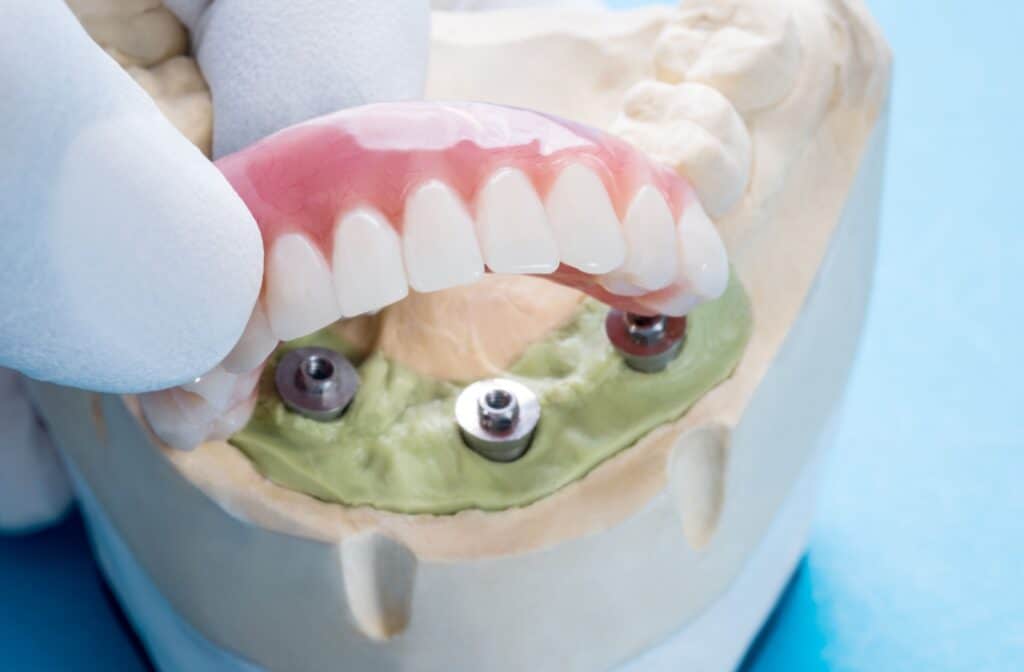Are Implants Better than Dentures?
Determining whether dentures or dental implants are better for replacing lost or damaged teeth depends on several factors. The best way to determine whether dentures or dental implants are best for your needs is to visit your dentist and get a professional opinion.
What Are Dental Implants?
Dental implants are a more permanent option for replacing missing teeth.
There are 2 types of dental implants:
- Endosteal implants consist of a titanium or ceramic post that is surgically inserted into the jawbone. This post can fuse with the bone, providing a stable base for a crown, which looks and functions like a natural tooth. This process, known as osseointegration, typically takes several months but offers a long-lasting solution for missing teeth.
- Subperiosteal implants are positioned beneath the gums and above the jawbone, and feature a metal framework with small extensions that emerge slightly from the gums. Subperiosteal implants are often suggested for individuals who lack sufficient healthy jawbone for endosteal implant placement or who prefer to avoid additional procedures like bone grafts before implant placement.
Benefits of Dental Implants
One of the biggest advantages of dental implants is their stability. Since they are anchored into the jawbone, they should not shift or move. Additionally, implants help maintain jawbone density. When a tooth is lost, the jawbone can begin to deteriorate. Implants can stimulate the bone, preventing decay and preserving facial structure.
What Are Dentures?
Dentures are removable appliances that can replace missing teeth and surrounding tissue. They come in 2 main types:
- Complete or partial dentures offer a practical and budget-friendly solution for replacing missing teeth and enhancing the contours of your mouth and face.
- Partial dentures are typically comprised of plastic, nylon, or metal plates with multiple false teeth affixed, and clip securely onto natural teeth. Partial dentures are removable for easy cleaning.
Despite being artificial, dentures require daily hygiene maintenance to prevent plaque, tartar, and bacteria buildup that could potentially impact both your natural teeth and gums.
Benefits of Dentures
Dentures can offer an immediate solution for missing teeth. Unlike implants, which require a surgical procedure, dentures can be fitted relatively quickly. Modern dentures are designed to look natural and can significantly improve your smile and facial appearance.
When Are Implants Necessary?
Dental implants are often recommended for individuals who have lost one or more teeth but still have healthy gums and sufficient bone density. They are particularly beneficial for single-tooth replacements or for those who need a more permanent solution than bridges or partial dentures can offer.
Implants are durable and can last a long time with proper care. They also help maintain the jawbone’s integrity, preventing the sunken look that sometimes occurs with missing teeth. This is particularly important for seniors who want to preserve their facial structure as they age.

When Are Dentures Necessary?
Dentures are often the go-to option for those who need immediate tooth replacement. Whether due to an accident, decay, or gum disease, dentures can be quickly fitted, restoring function and appearance in a short time.
Dentures may provide flexibility, as they can be easily adjusted or replaced as needed. This makes them a convenient option for those who may experience changes in their oral structure over time. They also do not require surgery, making them suitable for those who may not be candidates for implants due to health issues.
Longevity and Maintenance
- Durability of implants: Dental implants are designed to be a long-term solution. With proper care, they can last a lifetime. Regular brushing, flossing, and dental check-ups are essential to maintain implant longevity. The crown may need to be replaced after many years, but the implant itself can last much longer.
- Durability of dentures: Dentures generally have a shorter lifespan compared to implants. They typically need to be replaced every 7–10 years due to wear and changes in the jawbone structure. Proper care, such as daily cleaning and regular dental visits, can extend their life, but they are typically not as durable as implants.
Health Considerations
Not everyone is a candidate for dental implants. Dentures may be a more accessible option for those with underlying health issues that may complicate surgery.
Age and Bone Density
Age and bone density play a significant role in determining suitability for implants. Patients with good bone density may be ideal candidates. Seniors could face challenges if they have experienced significant bone loss. Dentures are less affected by age and bone density, making them a more versatile option.
Making an Informed Decision
Deciding between dental implants and dentures is a significant decision that impacts your oral health. Both options offer unique benefits and come with their own set of challenges. By understanding the differences, considering your personal needs, and consulting with your dental professional, you can make an informed choice that best suits your lifestyle.
Book an appointment with a South Ancaster Family Dental to discuss your options in detail. Your smile deserves the best care, and making an informed decision today can lead to a healthier, happier tomorrow.

